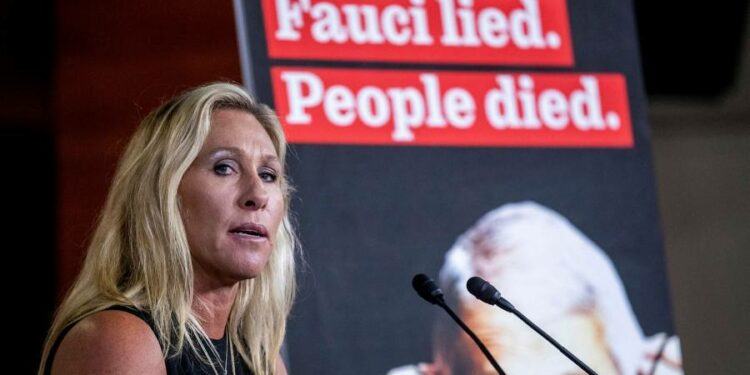Marjorie Taylor Greene, the Republican whose provocative social media posts have made her one of the most controversial members of the US Congress, has been permanently barred from Twitter after repeatedly posting misinformation about the coronavirus pandemic.
The sanction against the outspoken representative from Georgia is set to revive attention on Twitter’s efforts to police its app, almost a year after its ban of then-president Donald Trump touched off a storm of protest from the US rightwing.
Twitter announced the ban against Greene on Sunday, the day after she posted a tweet about what she claimed were “extremely high amounts of Covid vaccine deaths”.
The company said it introduced its policy on Covid-19 misinformation last year after seeing “persistent conspiracy theories, alarmist rhetoric unfounded in research or credible reporting, and a wide range of false narratives and unsubstantiated rumours” that could prevent people from making informed decisions and put them at risk.
Twitter introduced an escalating system of penalties, dubbed “strikes”, against infringers. The most serious sanction — a lifetime ban — is imposed for a fifth strike, or case of spreading false information.
The company recorded a fourth strike against Greene in August, resulting in a 7-day ban, when she falsely tweeted that the vaccines were “failing”.
The ban applied to Greene’s personal Twitter account but left her official congressional account unaffected. “We’ve been clear that, per our strike system for this policy, we will permanently suspend accounts for repeated violations of the policy,” Twitter said.
Taylor Greene issued a statement on the Telegram app on Sunday condemning what she claimed had been a failure by Twitter to take action against Democrats who had violated its policies. She added: “I stand with the truth and the people. We will overcome!”
Twitter’s action follows repeated Republican calls for an end to Section 230 of the Communications Decency Act, which gives online companies legal protection when they remove content. Republicans have also claimed that social media companies have favoured Democrats and used the provision to prevent them from speaking openly.
Democrats have also called for changes to Section 230, though for opposing reasons, claiming that the measure should be tightened to make companies liable if they do not act more aggressively to block misinformation and abuse on their sites.











